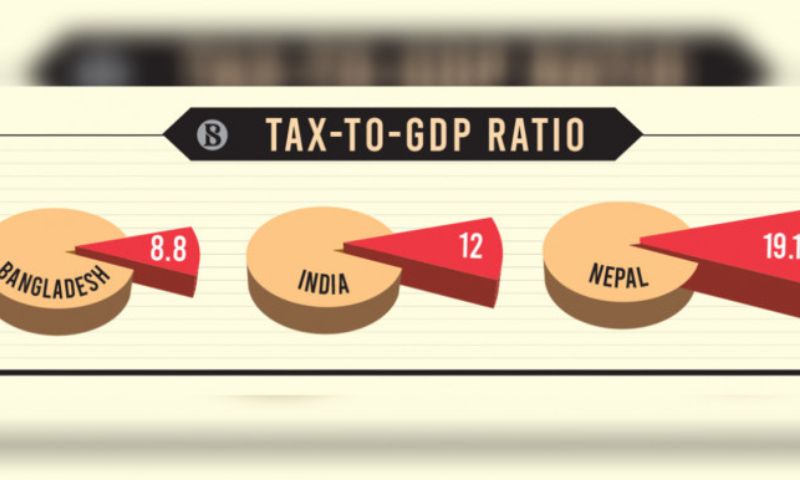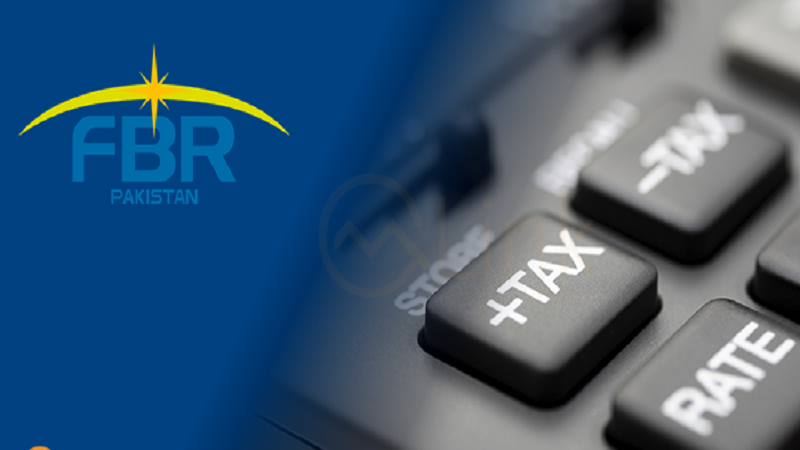Tax reforms, out of the box solutions, broadening of the tax base, small numbers of taxpayers, tax rate increases on salary class, and non-filers tax being raised; these jargons are used by all the officials associated with the Ministry of Finance and Federal Board of Revenue, but growth has been dismal, rather collection on net basis has been less as growth needs to see appreciation against the economies in the region.
The authorities made huge claims that the tax collection has been increased and the Rs 7000 billion revenue target received in the last fiscal year which recorded tremendous growth. But a small question arises when the inflation rate has been soaring, touching 30 percent with the rupee witnessing substantial erosion during the last fiscal year; the growth in revenue collection appeared to be dismal if these two factors have been accounted for in overall arrivals of the numbers. Tax to GDP is still on the lower side. Multinational agencies like the International Monetary Fund and World Bank have been advocating for a long time to reform taxation and arguing to impose tax on the agriculture sector, but for ages it has been left alone on the pretext that it has been a provincial matter. All the finance ministers in the past have always trumpeted that each year we are increasing the loan amount to farmers to improvise the agri production, but when it comes to tax it has been announced that it is the provincial subject. Moreover, the retail sector has also been considered as a sacred cow, several government officials categorically said that several big markets where hundreds of outlets have been functioning well but at the end of the day tax collection from that avenue has been minuscule.
Several surveys have been conducted but the result has been zero. Way back, a multinational agency made an estimate that when the tax collection was around Rs 2500 billion and the Government should curb leakages, pilferage and address the issues on war footing basis the tax collection would see an upsurge of Rsw 800 billion, which means 32 percent of the collection is going down the drain and not collected with same size of the economy.
Currently, the collection reaches Rs 7000 billion, if the same proportion of losses could be accounted for, the national exchequer should easily surpass the revenue collection to Rs 9000 billion with lesser effort. But the main obstacle which has not been addressed has been the trust deficit.
The government officials and ministries always tried to take measures to curb the current account deficit, trade deficit and fiscal deficit but failed to handle the trust deficit. The business community since long has not been happy with the working of the Federal Board of Revenue, the institution needs radical changes. One of the tax experts said that national identity cards should be treated as national tax numbers and the Government should digitize the whole mechanism of Federal Bureau of Revenue, tax collection, refunds and all the activities should be handled through automated ways.

Low Tax to GDP Ratio
Amayed Ashfaq Tola, President Tola Associates, said that the issue with Pakistan’s tax system is mainly two-fold: I. The tax-to-GDP ratio was 8.90 in FY 23 which is extremely low. Whereas, when we compare the same to our neighbor India, their tax-to-GDP was 11.1% in FY 23.
Further, Pakistan has an extremely shallow tax base. As per the interim report of the Reforms and Resource Mobilization Commission (“RRMC”), only 3.5% of the income filers contributed 90% of the income tax collection in Pakistan, whereas, in India, 22% of the total filers contributed 90% of the income tax collection.
A regressive tax system, as the share of direct taxes in the total tax collection was 45.19% in FY 23, compared to indirect taxes. Whereas, in India, the direct tax collection was 54.22% of the total revenue collection.

Potential Tax measures that can be taken
The interim report of the RRMC has suggested key measures such as, inter-alia, advance tax on undistributed reserves of companies, the Minimum Asset Tax (an extension of the CVT to local assets of tax resident individuals), and bringing the exporters under the Minimum Tax Regime from the existing Final Tax Regime. If the interim report of the RRMC is implemented in letter and spirit, then it is estimated that the Government can generate around Rs 2.5 trillion in direct tax revenue, said Amayed. As such, this will increase the tax-to-GDP ratio to double digits and also increase the share of direct taxes up to around 56% in the total tax collection in Pakistan. The next Government must realize that it is about time that subsequent fiscal measures must be aimed at truly broadening the tax base instead of milking the same old cow.

World Bank on Taxation
Recently, the World Bank released a report and addressed a few pointers under the head of the road map for addressing fiscal constraints that all concessional sales tax should be eliminated and apply standard rate on all goods subject to reduced rates. Moreover, they argued retailers should be in the tax system under the present law with an annual turnover to be defined for tax purposes.
Moreover, remove the import duty exemptions for non-exporters. The World Bank emphasized the reform of agriculture tax. They proposed to reduce or refine the current 12.5-acre tax exemption threshold to bring more agricultural land into the tax net.
Ensure appropriate categorization of land for tax rates, taking into account size, location, and irrigation status (simulations of an acreage-based tax indicated a potential to generate additional provincial revenues of around 1 percent of GDP.
If the size of the country’s economy has been around $280 billion, one percent would be around $2.8 billion, translating into around Rs 770 billion in additional tax collection. For a $1 billion tranche of IMF or Rs 275 billion, we have to eat bitter pills, like increasing gas and electricity tariffs, raising the interest rate, trimming public development spending, and keeping the exchange rate on market-based happenings. This has been only one avenue sighted by the World Bank, it has been discussed in the market that various sectors that are untapped or not utilized to full of their potential have the room to generate another Rs 2000 billion to Rs 3000 billion without burdening the people who are under tax belt.

Overhauling Pakistan’s Tax Landscape
Ali Nawaz, CEO of Chase Securities, said that there exists an urgent need for radical measures to propel revenue collection and plug the gaps in the current framework.
“To fortify the fiscal foundation, a multifaceted approach is imperative. First and foremost, the tax base must be broadened, ushering in the informal sectors to ensure a more comprehensive revenue stream. Simultaneously, a simplified and transparent tax code, coupled with streamlined procedures, is crucial to enhance compliance and eliminate ambiguity”, Ali said.
Progressivity in the taxation structure is essential, demanding a revision of tax brackets to bridge the income disparities and ensure equitable contributions. Embracing technological advancements is non-negotiable—investment in a robust digital infrastructure, e-filing systems, and online payment platforms will undoubtedly bolster efficiency.
The battle against corruption within tax authorities needs strengthening to foster a more transparent tax administration. Public awareness campaigns should underscore the integral role of taxes in national development, fostering a sense of responsibility among citizens. Incentivizing timely and honest tax payments, along with sector-specific tax reforms, will further fortify the system. International collaboration is key in combating cross-border tax evasion, while the continuous monitoring and evaluation of tax policies will facilitate adaptive strategies.
Ali pointed out that the historical lack of consistent implementation and the existence of exploitable loopholes have hindered effective revenue collection. As we move forward, a comprehensive, dynamic, and courageous approach is indispensable to reshape Pakistan’s tax landscape and pave the way for a more financially robust future.























